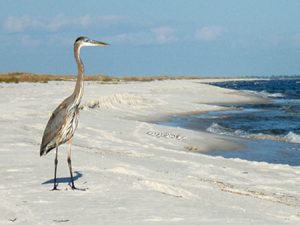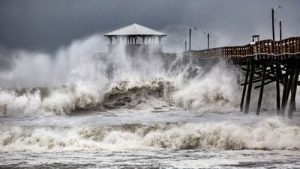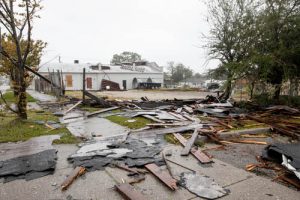Do Hurricanes Discriminate?
 Growing up by the beach near Wilmington, North Carolina and running through wetlands as a child was a privilege. Looking at the world around you, seeing the water glisten in the early morning, watching the herons fly overhead, and in the distance, being able to hear the slow, steady roll of the waves crashing on the shore of a not-so-distant barrier island. Once you realize this gem is your home, you develop a love for it like no other. You also learn how dynamic nature can be as you watch the ocean change its mood from a raging sea to a glass-covered pond in a matter of days. Like many beach towns on the East Coast, you grow up understanding that living in this treasured environment also comes with a cost. Every few months out of the year, you keep your eye on the weather report just a little more than usual and keep a stack of plywood on hand in the backyard with a few gallons of gas and water.
Growing up by the beach near Wilmington, North Carolina and running through wetlands as a child was a privilege. Looking at the world around you, seeing the water glisten in the early morning, watching the herons fly overhead, and in the distance, being able to hear the slow, steady roll of the waves crashing on the shore of a not-so-distant barrier island. Once you realize this gem is your home, you develop a love for it like no other. You also learn how dynamic nature can be as you watch the ocean change its mood from a raging sea to a glass-covered pond in a matter of days. Like many beach towns on the East Coast, you grow up understanding that living in this treasured environment also comes with a cost. Every few months out of the year, you keep your eye on the weather report just a little more than usual and keep a stack of plywood on hand in the backyard with a few gallons of gas and water.
 Hurricanes are part of life here. You become prepared and develop a protocol; all the while, you admire the sheer power of a natural event that will always be beyond your control. My family has always been fortunate during hurricane season; we are more worried for our safety and less concerned about whether or not we would be able to handle the property damages that partner with the immense wind and rain. Granted, my family took a toll from Hurricane Florence in 2018, but we still had a home, resources, and help, and we recovered. But this is not the case for all. Hurricanes leave damages that not everyone can afford. Repairing your house is not always an option, having a car to drive to the only stores open in town is not always possible, receiving emergency services is not always within your reach, and finding the necessary resources to recover may not be made accessible to all.
Hurricanes are part of life here. You become prepared and develop a protocol; all the while, you admire the sheer power of a natural event that will always be beyond your control. My family has always been fortunate during hurricane season; we are more worried for our safety and less concerned about whether or not we would be able to handle the property damages that partner with the immense wind and rain. Granted, my family took a toll from Hurricane Florence in 2018, but we still had a home, resources, and help, and we recovered. But this is not the case for all. Hurricanes leave damages that not everyone can afford. Repairing your house is not always an option, having a car to drive to the only stores open in town is not always possible, receiving emergency services is not always within your reach, and finding the necessary resources to recover may not be made accessible to all.
 Hurricanes disproportionately affect those of lower socioeconomic status. Instead of being helped in a situation that is beyond their control, many suffer in silence, voices muffled by bills with no end in sight; the only option left is to leave the places they call home. Once the poor have been displaced, people who can afford it swoop in, buy up the damaged property and revitalize it, targeting those with higher income, gradually erasing the area’s original identity and history. This social process can be identified as a form of gentrification and has been heavily researched in cities such as New Orleans, Louisiana, in the years following the devastation of Hurricane Katrina.
Hurricanes disproportionately affect those of lower socioeconomic status. Instead of being helped in a situation that is beyond their control, many suffer in silence, voices muffled by bills with no end in sight; the only option left is to leave the places they call home. Once the poor have been displaced, people who can afford it swoop in, buy up the damaged property and revitalize it, targeting those with higher income, gradually erasing the area’s original identity and history. This social process can be identified as a form of gentrification and has been heavily researched in cities such as New Orleans, Louisiana, in the years following the devastation of Hurricane Katrina.
Although New Hanover County, North Carolina, differs greatly from New Orleans, it similarly has an economy largely based on tourism, a diverse socioeconomic range within its population, and has experienced a fair share of hurricanes. Yet, despite these similarities, there is little localized research to observe if hurricanes like Florence have significantly affected social processes such as gentrification. This is a serious gap in understanding that I plan to fill through my RCC Fellowship research. By using past studies on social and physical vulnerability to inundation (flooding), replicating research methods conducted in New Orleans, and stitching together other acquired resources, I plan to build a more holistic picture of how Hurricane Florence has shaped the communities of New Hanover County. With the incorporation of both numerical analysis and the perspective of residents, I hope to shed light on a potentially significant environmental justice issue in my own backyard, and provide useful information for more equitable response and recovery policies for when Wilmington sees its next hurricane blow in from the horizon.
— Cate Arnold
 RCC Fellow Cate Arnold is a senior at the University of North Carolina Wilmington. She is an Honors College student pursuing a double major in Environmental Science and International Studies with minors in Political Science and Geographic Information Systems. She grew up in Wilmington, NC and has volunteered with the Good Shepherd Center and Habitat for Humanity while also participating in local restoration efforts, beach clean-ups, and rain garden construction. At UNC-Wilmington, she serves as a grant reviewer for The Green Initiative Fund. She is also on the executive board of the school’s chapter of Plastic Ocean Project, a local non-profit.
RCC Fellow Cate Arnold is a senior at the University of North Carolina Wilmington. She is an Honors College student pursuing a double major in Environmental Science and International Studies with minors in Political Science and Geographic Information Systems. She grew up in Wilmington, NC and has volunteered with the Good Shepherd Center and Habitat for Humanity while also participating in local restoration efforts, beach clean-ups, and rain garden construction. At UNC-Wilmington, she serves as a grant reviewer for The Green Initiative Fund. She is also on the executive board of the school’s chapter of Plastic Ocean Project, a local non-profit.
![]() The Rachel Carson Council depends on tax-deductible gifts from concerned individuals like you. Please help if you can.
The Rachel Carson Council depends on tax-deductible gifts from concerned individuals like you. Please help if you can.
![]() Sign up here to receive the RCC E-News and other RCC newsletters, information and alerts.
Sign up here to receive the RCC E-News and other RCC newsletters, information and alerts.